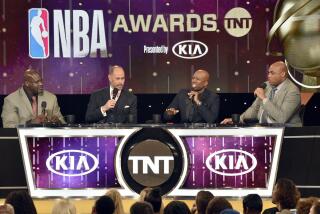It’s a (Big) Man’s World in NBA, Thank Goodness
- Share via
Now that the NBA finals pit the Houston Rockets against the New York Knicks, I find myself content. Order has been restored to professional basketball.
It’s always nice to have one’s conceits verified, opinions validated, and my long-held and stubbornly defended conviction was that basketball today belonged to the big man in the pivot.
My position, previously unshakable, had nevertheless been rocked somewhat in recent years. Blame Isiah Thomas, Michael Jordan and Charles Barkley. And to an extent, Larry Bird.
You see, when most of us came upon the professional game, it was dominated by, not to say overwhelmed by, two men in the pivot, Bill Russell and Wilt Chamberlain. They met, more or less annually in the championship game--or the game that decided the championship whether it was the final or not. Russell usually won.
Of course, Russell came into those games with the likes of Bob Cousy, Bill Sharman, K.C. Jones or Sam Jones surrounding him. Not to say Jim Loscutoff or Tom Heinsohn or Tom Sanders. But Chamberlain came in with the likes of Paul Arizin, Guy Rodgers, Tom Gola and Al Attles.
Even in earlier incarnations, the game had been the property of the mighty George Mikan, who used to set up housekeeping in the key in the days before three seconds were all you were allowed there at a time.
It was easy to pick the champion. Go with the team that had the biggest and most successful center. No sub-seven-footers need apply. Everybody else out there was the chorus line.
Oh, the big guys needed some help. But not much.
On the other side of the coin, you had some brilliant all-time talents who could never crack the title ranks. Until they got behind a dominant center. Jerry West before Chamberlain comes to mind. Oscar Robertson before Kareem Abdul-Jabbar.
You just didn’t win the championship with what came to be known as “point guards” or “power forwards.” Portland won when it got Bill Walton. The Lakers got Abdul-Jabbar (and he got Magic Johnson, whom he needed as much as he had needed Oscar Robertson).
It’s hard to tell when the pendulum started to swing. Maybe with the 1974-75 Rick Barry Warriors. The 1977-78 Washington Bullets: What they were doing with the title was baffling--an over-aged, under-sized Wes Unseld in the pivot. But they had Elvin Hayes pulling down 1,000 rebounds.
The Seattle SuperSonics won with mirrors in 1978-79. But when the Lakers got Magic, it was all Abdul-Jabbar again.
The revolution began in earnest in 1986-87 when the Detroit Pistons, who boasted Isiah Thomas and not much else, barely missed eliminating the Boston Celtics and reaching the finals. The next year, they reached the finals--but came up a basket short against the Lakers in the title game.
The next year and the next after that, the Pistons threw everybody’s calculations out the window when they won championships with the likes of Bill Laimbeer and James Edwards at center.
And for the next three years after that, the game belonged to a 6-foot-6 guard out of North Carolina--fellow by the name of Michael (Don’t Call Me Mike) Jordan, who played a game several feet above the rest of the league and had once referred to his teammates (accurately if impoliticly) as “my supporting cast.” His centers, Bill Cartwright and Will Perdue, were not even that.
The Era of the Big Man seemed completely over. Scouts scoured the bushes for pony-sized players who could handle the ball, run an offense and, it was hoped, play the kind of game where they could sell advertising on the soles of their shoes.
It’s hard to let go of your hard-won prejudices, so for those of us who had accepted it as Holy Writ that you won championships only with the superior seven-footers in the pivot, the Thomases and the Jordans had become an acute embarrassment. Titles, in our winter books, were to be won in this league by (a) Patrick Ewing, (b) Hakeem Olajuwon, (c) David Robinson or (d) Shaquille O’Neal.
It’s reassuring that it’s Olajuwon and Ewing. Not a forward such as Karl Malone, a guard such as Reggie Miller or even a Jordan-heir such as Scottie Pippen.
Houston doesn’t square off against New York, Olajuwon squares off against Ewing. On the surface, it’s a replay of the old Chamberlain-Russell matchups--the Terminator (Olajuwon) against the Intimidator (Ewing).
It’s nice to know some things never change. They simply take a while to come full circle. It’s nice to be able to say, “I told you so!” again.
I’m sure glad Michael Jordan thought he could hit the curveball.
More to Read
Go beyond the scoreboard
Get the latest on L.A.'s teams in the daily Sports Report newsletter.
You may occasionally receive promotional content from the Los Angeles Times.










